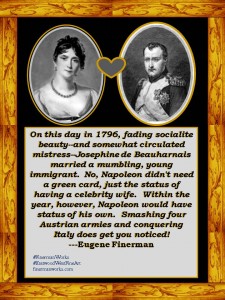Did man evolve from the lemming? History often seems to be a road map to a cliff. On April Fools’ Day, we should remember the colossal buffoons who have shaped and sabotaged our world. Their profound stupidity remains our legacy. If only for therapeutic revenge, we hereby recount their calamitous lives. The culprits are in chronological order.
– – – – – – – – – – – – – – – – –
Andronicus Ducas, 1071 A.D.
Andronicus Ducas became the inadvertent father of Turkey and the Crusades. The Byzantine general simply wanted to kill his emperor but was too finicky for an assassination. Ducas waited until the imperial army was fighting Turkish nomads and then ordered a retreat, abandoning the emperor to the enemy. The general overestimated the army’s ability to retreat, however. It disintegrated, leaving Anatolia — half the empire — defenseless. The Turks weren’t nomads after that. Anatolia is now called Turkey. The Moslem triumph ignited the Crusades, and its hordes of pious killers destroyed what was left of Byzantium.
– – – – – – – – – – – – – – – – –
Emperor Yung-lo, circa 1415 A.D.
China declared an end to progress. Emperor Yung-Lo had the best of everything. He ruled the most powerful, most prosperous, most technically advanced, most populous country in the world. At a time when English ships never sailed farther than Portugal, the Chinese fleet was exploring East Africa. Considering China’s extravagant superiority, Yung Lo decided that there was no point to improving on perfection. The rest of the world had nothing to offer China. Yung Lo abolished the fleet, discouraged trade and promoted a tradition-bound regimen of education. Yung Lo’s policy lasted for six centuries and so did China’s stagnation.
– – – – – – – – – – – – – – – – –
Ferdinand of Aragon, 1483 A.D.
The king actually was bright and completely free of scruples; Machiavelli considered him a role model. However, Ferdinand turned out to be a little too clever.
He had a get-rich-quick scheme. The wily and avaricious king commissioned a Spanish Inquisition in 1483 with the idea of gouging wealthy suspects who showed any reluctance toward pork. Of course, the bulk of the loot would go to the crown. The Inquisition, however, was not content to be Ferdinand’s pickpocket. It was going to save Spain from tolerance, innovation and whatever else reeked of heresy. To his dismay, Ferdinand could not control the Holy Office’s pyromania. He became its most comfortable prisoner, complying with the rabid dictates of the Grand Inquisitor. While the rest of Europe had the Renaissance, Spain had the Inquisition.
Pope Leo X, 1517 A.D.
Pope Leo X had more taste than sense. The Medici esthete regarded St. Peter’s Basilica as a medieval barn and insisted upon its complete renovation. Yet even a Medici couldn’t afford the expense, so the pope authorized the wholesale peddling of indulgences to raise the money. The brazen hucksterism outraged Martin Luther, who urged a reformation of the church. In Rome, Leo was more interested in Raphael’s blueprints than in Luther’s protest. The pope didn’t care about theology and he didn’t foresee any political repercussions. Leo waited until 1520 to address Luther’s criticism of a venal and oblivious papacy. By that time, Northern Europe wasn’t listening.
– – – – – – – – – – – – – – – – –
General John Burgoyne, 1777 A.D.
General John Burgoyne won the American Revolution but not for his side. The British general began his invasion of upstate New York with 30 carts of luggage, a wine cellar, someone else’s wife and 9,000 soldiers. He chose an itinerary that took him through forests, swamps and 20,000 American troops. Burgoyne’s surrender at Saratoga was an unprecedented triumph for the colonists; heretofore, they had claimed successful retreats as victories. The French were elated by the news of a British disaster. Saratoga proved that the colonists could win, and France embraced any cause — even a rustic republic — if it undermined England.
– – – – – – – – – – – – – – – – –
Louis XVI, 1791-1792 A.D.
Louis XVI overthrew the French monarchy. Except for the unlucky guards at the Bastille, the French Revolution had started as a very polite affair. The original goal was a constitutional monarchy, but Louis XVI opposed even moderate reform.
In 1791, the royal family attempted to flee the country; however, the Bourbons stopped for a picnic and were captured. Louis also was writing to his fellow monarchs, urging them to invade France. When this correspondence was discovered, it did little for Louis’ popularity or longevity. Louis almost did as much harm to the other monarchies. They declared war on France … and lost.
The French Republic promoted officers on the basis of ability rather than pedigree. Lieutenant Bonaparte showed particular promise.
– – – – – – – – – – – – – – – – –
Fanny Kaplan, 1918 A.D.
Fanny Kaplan nearly killed Lenin. A member of a political party more radical than the Bolsheviks, Kaplan gunned down the Soviet leader. He survived but never recovered. (Kaplan’s execution was an immediate success.)
The once robust Lenin died in 1924, at the age of 53; and the conniving, paranoid Stalin began his ascent. This is one of the great “what ifs” of history. If Kaplan had killed Lenin, the Bolshevik Revolution would have collapsed; Russia likely would have been ruled by a surviving cousin of the imperial family or a Slavic version of Francisco Franco. Stalin would have returned to his previous outlet for sadism as a newspaper editor.
If Kaplan had not tried to kill Lenin, he might have lived another 20 years, Stalin would have stayed in middle management and some 20 million people would have died only of Soviet health care.
– – – – – – – – – – – – – – – – –
So, there are the Seven Blunderers of the World. In all sadistic likelihood, they have been reincarnated and you know every one of them.


